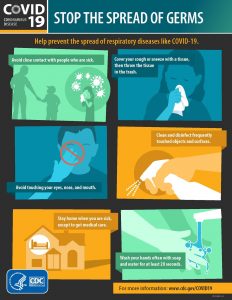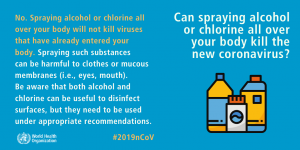Local health officials, law enforcement prepare for the spread of coronavirus
By Kelli Duncan For Chronicle Media — March 12, 2020 As the number of confirmed cases of coronavirus in Illinois continues to climb — including one case in Kane County — worry and anxiety among residents grows.
As the number of confirmed cases of coronavirus in Illinois continues to climb — including one case in Kane County — worry and anxiety among residents grows.
But local agencies like the Kane County Health Department are responding, ramping up their coordination and preparation if and when it expands the suburbs, according to Susan Stack, the departments communications coordinator.
“We started holding weekly meetings and now it’s almost daily meetings where we’re briefed on information that’s coming from the [Centers for Disease Control and Prevention] and from IDPH (Illinois Department of Public Health),” Stack said.
The department has also reached out to municipalities and emergency response agencies across the county to keep them informed of any updates in the spread of the virus, Stack said.
“We stand ready to mobilize and do what needs to be done if this becomes a bigger problem in our area,” she said.
Stack, who also serves as the Public Information Officer with the Kane County Emergency Management team, said the county conducts regular trainings with local agencies to prepare for a viral outbreak like the coronavirus.
“We do training like this all the time so we’ve been working with our partners and have been keeping them alerted,” she said.
The state of Illinois has a special task force that is designed to respond to viral outbreaks and other large-scale problems that might deplete the resources of local police departments and other agencies.
The Illinois Law Enforcement Alarm System (ILEAS) has 10 Mobile Field Force teams across the state designed to “provide a rapid, organized and disciplined response to civil disorder and public safety emergencies,” according to the ILEAS website.
Lieutenant Matt Udelhoven of the Elgin Police Department said he has served as the Commander of the Kane and McHenry County ILEAS Mobile Field Force since March of 2010.
One thing that the ILEAS Mobile Field Force prepares for in case of events like the coronavirus outbreak is how to distribute pharmaceutical materials to the public in a calm and orderly manner.
Udelhoven said his team, which is comprised of 45 members from police departments across the two counties, will hold it’s regular pharmaceutical distribution training on April 9 at Elgin Community College’s Center for Emergency Services in Burlington.
“We planned this training in November or December before anybody had even heard of the coronavirus,” Udelhoven said. “We’ve trained with our health department a couple times over the years and we’ve ran some similar drills so we’re very prepared for this kind of situation.”
ILEAS engages in regular pharmaceutical distribution drills every 18 months to two years, Udelhoven said.
“We’ve been doing this for the last 10-plus years so it’s just basically another training drill with the exceptional timing of an actual coronavirus going around,” he said.
For the drill, Mobile Field Force members will drive to a location outside of the campus, pick up packages of fake pharmaceutical materials and then transport them caravan-style to a few buildings on the campus designated as the emergency medical sites, Udelhoven said.
“[We will practice] setting up as if it’s a hospital or a high school or whatever venue we would be choosing in the area and we look at how would we get the medications into the building,” he said.
The team will need to work together and communicate efficiently as they transport the materials and secure the building area, Udelhoven said.
“[We would] then coordinate with the health department on the registration process and getting people in and out in a timely and peaceful manner,” he said.
 This training was put to the test in 2009, when the Kane County Health Department called on the ILEAS Mobile Field Force to help keep the peace while they administered the H1N1 or “swine flu” vaccine at an emergency medical site constructed in Larkin High School.
This training was put to the test in 2009, when the Kane County Health Department called on the ILEAS Mobile Field Force to help keep the peace while they administered the H1N1 or “swine flu” vaccine at an emergency medical site constructed in Larkin High School.
“They ran the internal operations and we were just kind of there to control traffic and keep the peace,” Udelhoven said. “They had hundreds of people in the hallways at Larkin High School that day and several more hundred outside waiting in line.”
Udelhoven said he plans to invite the local health departments to attend the team’s April 9 training so they know that the Mobile Field Force is ready to go should they be needed.
“I’d like to call and invite the health departments to see if they just want to come out in the morning and maybe give us any information they have or anything they’ve changed,” he said.
The ILEAS Mobile Field Force was formed for situations where agencies like the Kane County Health Department may find that themselves in need of support from a large-scale mutual aid team, Udelhoven said.
“The beauty of it is that it’s not just the Elgin or Kane and McHenry County area, we have teams throughout the whole state so if this becomes something of a large-scale in this area, we can draw from nine other teams spread throughout the state,” he said.
As the spread of the coronavirus comes closer to home, it is important to know that local agencies in Kane County are prepared for viral outbreaks like this one, Stack said.
“We do have that system in place that, if we need to mobilize, we call on all of our partners and say ‘OK now is the time,’” she said. “So we’re ready for that.”
With just five confirmed cases in the state of Illinois, residents do not need to worry about altering their daily travel routines at this time, according to a news release from the IDPH.
However, the CDC has issued travel guidelines for anyone who may be planning to travel out of the state or out of the country.
Suburban school districts have no current plans to cancel school on account of the virus, although District U-46 encouraged parents to keep their children home if they are feeling sick in a news release on the district’s website.
“This is basically a time for individuals to review their hygiene program,” Stack said. “Certainly hand washing is extremely important with any type of viral disease, but also cleaning surfaces and basically maintaining your home and your person so that you don’t pass along anything that you may have.”
Stack said anyone who believes they may have contracted the coronavirus should call their doctor or local urgent care facility right away.
“Do not go directly to an emergency room or to a clinic,” she said. “Call your doctor ahead of time or call the clinic or call the emergency room so that they can triage you by phone.
“If they suspect that you may have the coronavirus, they will bring you in a separate [entrance] so that you don’t infect others and then they’ll do the monitoring and the testing.”
While the symptoms of the coronavirus are mild in most cases, there are certain populations who face a greater risk of complications if they contract the virus.
According to the CDC, “older adults and people who have severe chronic medical conditions like heart, lung or kidney disease seem to be at higher risk for more serious COVID-19 illness.”
Stack said that people in one of these at-risk populations should avoid contact with anyone who may be feeling ill and should consult with their personal healthcare professional on what else they can do to better protect themselves.
To stay up to date on the spread of the virus, visit the Kane County Heath Department’s website (kanehealth.com), which now features a live feed of the most recent information provided by the CDC.







